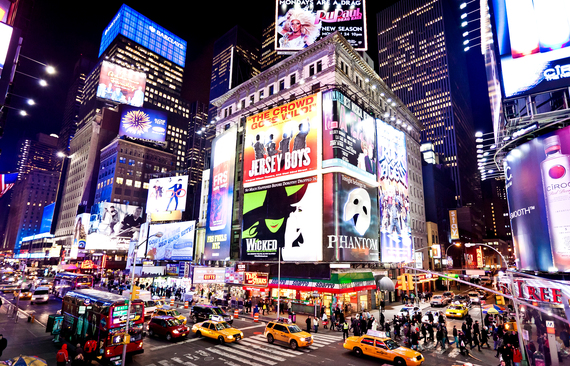It is my privilege to work in one of the greatest industries on the planet -- Broadway. It's not just the razzle dazzle; it's the passion that fuels an entire industry dedicated to creating platforms for stories that need to be told. And from that perspective, the theater business is essentially a content business.
As a marketer, I'm seeing first hand how the rapidly changing media and technology landscape is upending Broadway. This isn't news. You can read countless opinions on whether or not this change is a good thing or a bad thing. But regardless of who's right, it's officially a "thing" that is putting all business norms on guard.
Look no further than variable pricing and the impact of dynamically pricing our shows to drive maximum value.
Look no further than mobile phone usage and the impact of our patrons accessing information on the fly and on the go.
Look no further than the growth of digital advertising technologies and the impact of targeting audiences in ways never before possible.
These shifts point to what's possible on Broadway - not just tomorrow but today. From artificial intelligence and VR/AR to customized bots and sophisticated tracking technologies, these are all areas of opportunity that we explore daily as an agency - and they are just waiting to be tapped.
However, this isn't change that can you can "ride out" on the path of least resistance or that a few brave souls can move ahead and conquer on the industry's behalf. These are changes that as an industry we must face together. And in our current state, I'm worried we will be our own worst enemy if we don't coalesce behind a collective vision that acknowledges and embraces the changes here today and those that are on the horizon.
Here are the three biggest headwinds that I believe we'll face on our journey.
1. We need the artists in the marketing conversations.
The artists that are behind many of the brands we represent are inherently amazing storytellers. They are in the business of engaging audiences and are best in class at what they do, which is why it kills me when they are often not in the room for the marketing conversations. I've heard a range of reasons for this absence - from ego protection to time constraints to contractual terms. Whatever the reason, the changing landscape in media behavior requires storytelling brands to speak in places, outlets and ways that they have never had to before; and the visionaries behind these stories must help pioneer the brand to new canvases. We are often selling a $20 million Broadway musical with a cast of fifty in a renowned theatre - are we prepared to express this magic on the face of a minuscule Apple Watch? Are we prepared to bring this to life for our patrons on the run on their Android device? We need the artists to help us navigate this new frontier of creative storytelling and begin to see their brands through the lens of how people consume their stories.
2. We need to better understand our patrons.
A budget is a reflection of a person's values. This will sound obvious to most, but I'm not convinced it's the reality. Because based on the budgets I see, you would be hard pressed to believe that we are truly committed to evolve as fast as our consumers are. Traditional media advertising outlets still dominate the budget despite the fact that consumers have clearly shifted their media preferences to digital platforms. Today on Broadway over 50% of consumers visit show websites on their mobile device, while less than 15% of digital transactions occur on a mobile device - and less than 15% of the overall advertising budget utilizes this platform. There is an information-sharing gap between those on the front lines of studying consumer behavior and those making the ultimate budget decisions, particularly as it relates to technology. This gap must be closed. And it's a two way street: leadership needs to show more curiosity and care about understanding their patrons' behavior and those on the front lines need to be more concise in communicating insights about how patrons' behavior is changing. We need to stop thinking of this as a "marketing" conversation and begin thinking of it as a "patron" conversation.
3. We need to stop thinking we're "different."
I've heard this too many times - "But this is the theatre business, Damian. That's not how we do things here." Don't get me wrong - the magic of live storytelling is truly special. (And of course I believe that, I've built a business and a nonprofit around that central idea!) The problem is that the known, "safe" path is actually the far more dangerous path considering it runs directly against the trend lines we're seeing. Variable pricing is a great illustration of this challenge. For better or worse, Broadway has become a market where the top bid wins. That's the power of supply and demand - and the output of our pricing model. Has variable pricing been good for business? Absolutely, yes. But we would be crazy to believe there won't be consequences for embracing this model. We charge as much as we can because we can, and consumers have clearly noted this change in how we price our tickets. You might say that this is how most other industries operate. To which I'd say - exactly! That's why I struggle with the idea that we're so "different" than everyone else when we speak of our responsibilities in how we interact with our patrons at all touch points. We would be foolish to believe we will buck consumer trends because we are "different" or "special" for some greater good. Besides not being true, it's dangerous.
Yes, these are the headwinds. But I'm taking a big gulp of "the glass half full" because there is just too much opportunity to get stuck in the headwinds.
